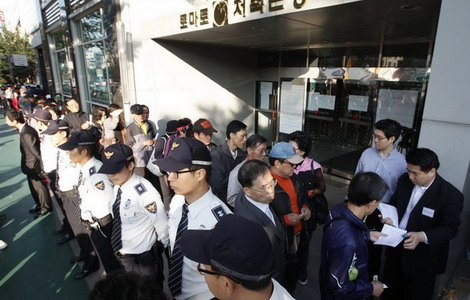Fear for jobs ignites 'English crisis' in Japan
Updated: 2011-09-23 06:38
(Agencies)
|
|||||||||||
TOKYO- It's eight in the morning in a Tokyo office building, and a dozen middle-aged Japanese businessmen sit inside small booths, sweating as they try to talk English to the instructors in front of them. ?
"I hope my wife will understand my hobby," one 40-something man says, opening his mouth widely around the English words.
He is one of legions of Japanese businessmen, or "salarymen," struggling with a language they thought they had left behind them in school as fears mount that the growing push by Japanese companies into overseas business will mean a dark future for them without usable English.
This is especially true these days, with the strong yen and a lagging domestic market prompting more firms to look overseas for business opportunities essential for their bottom lines.
"I had a business trip to Amsterdam last year and that really was tough. My boss spoke no English, and I had to speak English for the first time in 10 years," said Masahide Tachibana, a 39-year-old software developer.
Tachibana now gets up at 5:00 a.m. to take morning lessons at a central Tokyo branch of Gaba, an English language school.
"I've always wanted to brush up my English and that business trip ignited my aspirations," said Tachibana, as around him other businessmen and women pack up and hurry to work after their 45-minute, one-on-one lessons.
Japan , despite being the world's third-largest economy and a major export powerhouse, is known for its poor English-speaking ability even though six years of study are required in middle and high school.
The country's average score on the TOEFL iBT, a computer-based test of English as a foreign language, in 2010 ranked 27th among 30 Asian countries, below Mongolia and Turkmenistan.
Only 9 percent of 1,156 white-collar workers surveyed by Recruit Agent, a recruiting firm, claim to be able to communicate in English. Many respondents evaluated their speaking and listening aptitude as "Barely." ? ? ? ?
But things are starting to change, prompted by a growing sense of urgency about employment.
No English, no jobs?
The first push came from online retailer Rakuten's 2010 decision to make English their official language. Fast Retailing, the operator of the Uniqlo apparel chain, also wants to make English its official language by 2012 and test its employees for proficiency.
"Rakuten's decision triggered a shock-wave that's extended to many other companies, especially manufacturers, because they too are under pressure to expand outside a shrinking home market," said Yuriko Tsurumaki, a Recruit Agent spokeswoman.
"Not all Japanese firms have businesses overseas for the time being but people are seeing possibilities and sharing a sense of crisis (about English)." ?
Now nearly half of Japanese companies planning new hiring require applicants to be "business English users" - a big rise from 16 percent in July 2009, she said.
Highlighting fears among businessmen with poor English, a number of companies, including chip maker Elpida Memory and Murata Manufacturing Co, a maker of parts used in mobile phones and computers, are shifting some production outside Japan to cope with a currency near record highs.
The surging yen is also encouraging Japanese firms to acquire businesses overseas to build more revenue pillars, with trading house Itochu buying Britain's tyre seller Kwik Fit for $1 billion. ?
As a result, Japan's foreign language education market is growing, with learners more than willing to fork out plenty of money on lessons, DVDs or e-learning.
It rose 1.6 percent to $9.8 billion in 2010 from a year earlier, said Yano Institute of Research, and is set to grow another 1.8 percent this year, making it a rare bright spot amid lagging Japanese private consumption. ?
"This is just the start of Japan's real globalisation. Everyone is feeling that they'll see a no-English-no-job situation," Gaba's president Kenji Kamiyama told Reuters in a recent interview.
Thanks to avid English learners, Gaba says it has almost achieved its student number target for the year and predicts the upbeat trend will likely last for a while. Gaba says that on average, a student spends about 50,000 yen ($654) a month -- against an average 36,500 yen allowance for Japanese businesspeople.
Meanwhile, Rosetta Stone Japan, a Japanese unit of Rosetta Stone which provides software-based language-learning, says revenues for their English learning software more than tripled last year from a year ago. This year sales are seen doubling as more people spend for the company's software package priced at around 59,700 yen.
"The English crisis shows the rapidly changing environment Japanese firms face. Most Japanese businessmen, for a long time, avoided an English-speaking environment," Gaba's Kamiyama said.
"But they now know that they can't stay that way... It's been a real kick in the pants for them." ($1 = 76.420 Japanese Yen)
Hot Topics
Libya conflict, Gaddafi, Oil spill, Palace Museum scandal, Inflation, Japan's new PM, Trapped miners, Mooncake tax, Weekly photos, Hurricane Irene
Editor's Picks

|

|

|

|

|

|







